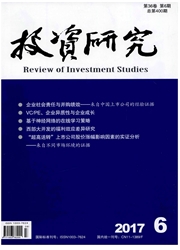

 中文摘要:
中文摘要:
本文以我国上市公司发布贷款公告后的股价反应为切入点,探究了不同贷款安排下的监督作用。结果显示,首先,无论获得单一还是共同授信,公司市场价值都会显著下降,说明贷款难以对我国上市公司发挥甄别和监督作用。其次,共同授信的股价反应甚至比单一贷款更加负面,原因在于共同授信银行之间的非合作会引发竞相放贷、再协商成本上升等问题,且资金来源的增加更易导致关联交易和掏空,使得贷款监督作用进一步恶化。最后,当共同授信中第一大银行贷款比例较高时公司价值下降最多,此时集中的贷款结构及重点监督虽然有助于提升监督效率,但同时也会向市场传达出借款人信息不对称更加严重的信号,且监督收益不能覆盖信息不对称带来的损失。
 英文摘要:
英文摘要:
This paper investigates loan monitoring efficiency among different loan arrangement through loan announcements. Inconsistent with the main results of developed countries, market value of borrower companies drop significantly after acquiring loans. Meanwhile, the negative impact gets severe when common loans are granted and gets even worse when a bank retains a larger share in a common loan. Our results reveal that the bank monitoring could not cover the moral hazard loss in China's stock market, and non-cooperative behavior in common loans like loan competition will further jeopardize the monitoring effect. Though more concentration of common loan eases the non-cooperative problem, it also signals potentially heavier information asymmetry of borrower which proved to be the dominant effect.
 同期刊论文项目
同期刊论文项目
 同项目期刊论文
同项目期刊论文
 期刊信息
期刊信息
